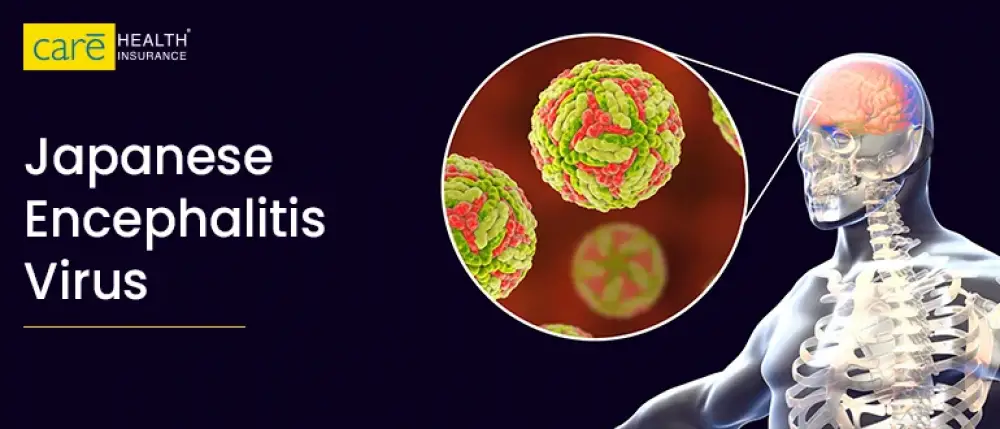Subscribe to get weekly insights
Always stay up to date with our newest articles sent direct to your inbox
Published on 5 Dec, 2024
Updated on 9 Dec, 2024
297 Views
3 min Read

Written by Ritika Malik
0Like
Be the First to Like
Japanese encephalitis is a viral infection affecting the brain. The first clinical case of Japanese encephalitis in Japan was identified in 1871. It has become a significant public health concern in various Asian countries, including India. Recent years have witnessed numerous outbreaks in several Indian states, such as Assam, Meghalaya, Manipur, Telangana, Tamil Nadu, Karnataka, Andhra Pradesh, Uttar Pradesh, Bihar, and Odisha.
This disease primarily impacts children and individuals in rural areas, particularly those involved in agriculture. It is the leading cause of viral neuropathy in endemic regions. Fortunately, vaccination is the most effective way to prevent Japanese encephalitis.
Keep reading this blog to discover how you can safeguard yourself against this preventable disease, Japanese encephalitis. Learn about its transmission and find the best ways to protect yourself. Let's start!
Japanese encephalitis, caused by the Japanese Encephalitis Virus (JEV), is a potentially severe mosquito-borne disease that affects the central nervous system. JEV is a member of the Flavivirus family, related to yellow fever, dengue, and West Nile viruses.
The bite of an infected mosquito of culex species causes Japanese encephalitis virus infection.This mosquito commonly breeds in rice fields or water like puddles, open sewers or fish tanks. The infected mosquito acts as the carrier of JEV passed between the mosquito, pigs, or water birds. When the mosquito feeds on an infected animal, it becomes a carrier, and when it bites a human, the virus is transmitted. The disease is mainly transmitted during the summer and monsoon seasons. It is important to note that the virus cannot be transmitted from human to human and can only be transmitted through blood.
People who are at high risk of getting a Japanese encephalitis infection include,
Most people infected with JEV are asymptomatic with only mild fever and headache. However, according to WHO, 1 in 250 cases may progress to severe illness, leading to brain inflammation, characterised by neurological symptoms such as headache, meningitis, neck stiffness, confusion, seizures, coma, and even death. Sometimes it becomes difficult to differentiate between symptoms of Japanese encephalitis and flu clinically. Those patients who survive severe illness may develop permanent neurological damage or disability.
Early identification of signs and symptoms is crucial in treating the Japanese encephalitis virus (JEV), reducing the chances of severity and mortality. Since no specific antiviral treatment targets JEV, treatment involves managing the symptoms, including supportive care, fluid management, medication, and hospitalisation in severe cases.
>> Also Read: What is Influenza? All You Need to Know About H3N2 Virus
Immunisation is the most effective way to prevent Japanese Encephalitis. As per government guidelines, Japanese encephalitis vaccination has been included in routine immunisation for children, and adult vaccination is available in states with significant cases. Travellers visiting endemic areas should also get the JE vaccine before their travel.
In addition to vaccination, another way to prevent infection is to control the population of mosquitos in endemic rural areas by using insecticides,fogging machines, and not letting water accumulate.
Also, using personal measures for prevention to avoid mosquito bites by using mosquito nets, mosquito repellents, and wearing full clothes, help.
Japanese encephalitis poses a silent threat but can be controlled and prevented through surveillance systems, vaccination drives and changed agricultural practices in affected regions. Additionally, it is essential to spread public awareness about the risks, symptoms and prevention of Japanese encephalitis virus infection to reduce the impact on susceptible communities.
However, even with precautions, life is unpredictable, and a medical emergency can arise anytime. Investing in comprehensive health insurance for your family will protect all your family members against serious health threats like Japanese encephalitis.
Discover the peace of mind that comes with Care Health Insurance. Our affordable health insurance plans cater to families of all shapes and sizes, from infants to seniors. We provide comprehensive coverage for everyone. Take the first step towards a secure future by exploring our family floater plans on our website today. Remember, an informed decision today ensures a protected tomorrow.
Disclaimer: All plan features, benefits, coverage, and claims underwriting are subject to policy terms and conditions. Kindly refer to the brochure, sales prospectus, and policy documents carefully.
Be the First to Like
शुगर कंट्रोल कैसे करे? जानें, डायबिटीज में क्या खाना चाहिए Care Health Insurance in Health & Wellness
Thyroid : मामूली नहीं हैं महिलाओं में थायराइड होना, जानें इसके लक्षण और घरेलू उपचार Care Health Insurance in Diseases
हाई ब्लड प्रेशर को तुरंत कंट्रोल कैसे करें? देखें इसके उपाय Care Health Insurance in Diseases
प्लेटलेट्स की कमी के लक्षण, कारण और इलाज क्या है Care Health Insurance in Diseases
What is Endocrinology? Hormones, Disorders & Treatment Care Health Insurance in Diseases
Do People with Mental Illness Have Less Heart Disease? Care Health Insurance in Diseases
एक्जिमा क्या है? देखें, इसके लक्षण और इलाज Care Health Insurance in Diseases
Guillain-Barré Syndrome (GBS): Causes, Symptoms and Treatment Care Health Insurance in Diseases